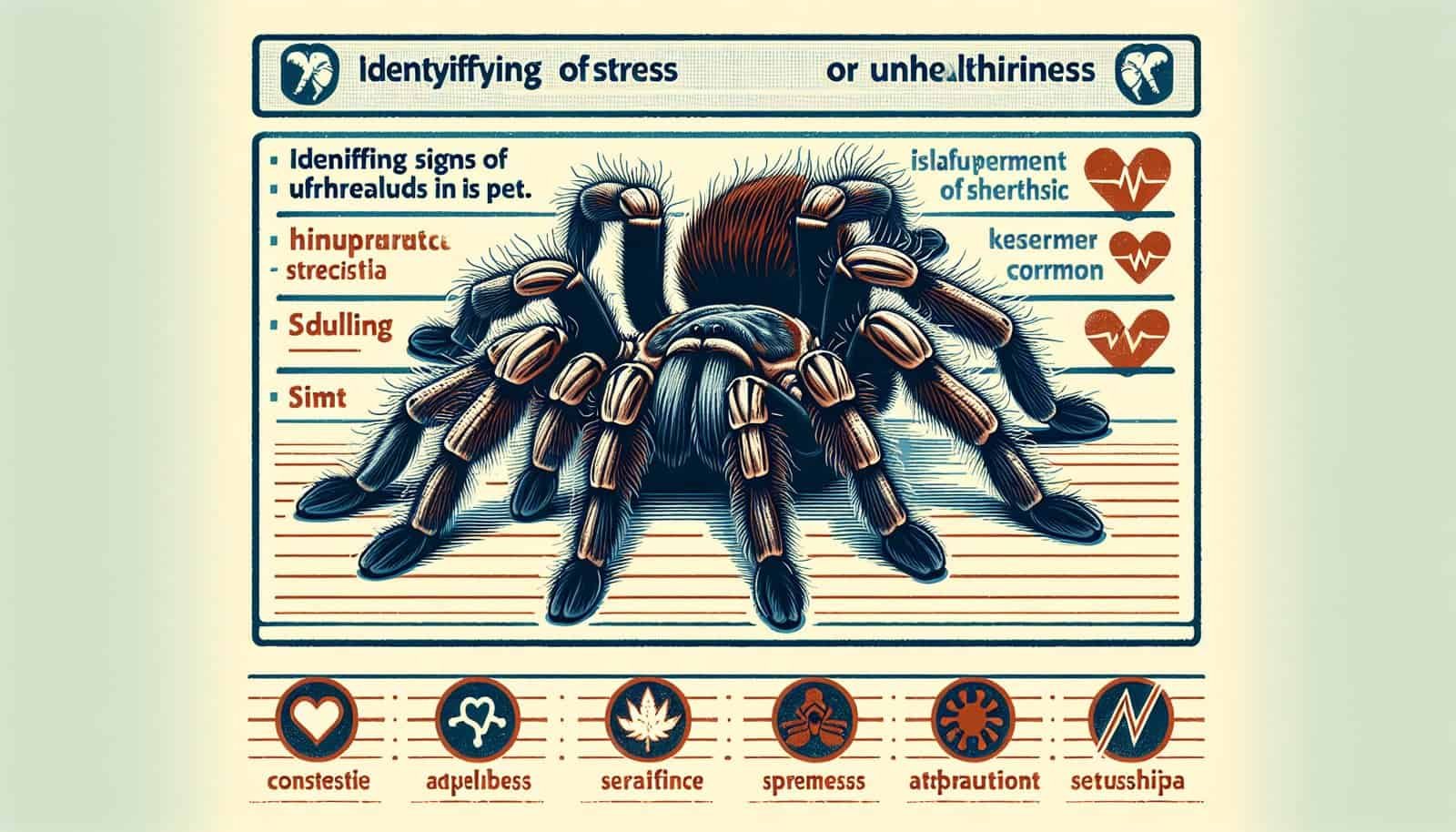Have you ever wondered how to tell if your tarantula is feeling a bit under the weather? Whether you’re a seasoned tarantula owner or considering getting one as a pet, it’s essential to understand the signs of a stressed or unhealthy tarantula. From changes in behavior to physical symptoms, being able to recognize these signs will help you provide the best care for your eight-legged friend. So, let’s explore the telltale signs that indicate a stressed or unhealthy tarantula, ensuring you can keep your furry arachnid companion happy and healthy.

Changes in Behavior
Tarantulas are typically known for their calm and docile nature, but when they begin to exhibit signs of increased aggression, it may indicate that they are experiencing stress or not feeling well. If your tarantula has been displaying aggressive behaviors such as lunging, hissing, or flicking their urticating hairs, it is crucial to take note of this change.
Another behavior that may signal a stressed or unhealthy tarantula is excessive hiding. While it is normal for tarantulas to seek shelter in their enclosure, if your spider is consistently hiding and rarely coming out, it could be a cause for concern. Tarantulas may hide due to various reasons, such as feeling threatened, experiencing discomfort, or being unwell.
Lack of activity is another warning sign to be aware of. Normally, tarantulas are active creatures that engage in web-building, exploring their surroundings, and hunting for prey. If you notice that your tarantula has suddenly become sluggish, unresponsive, or is spending an unusually long time motionless, it may be an indication that something is wrong.
Physical Signs
Monitoring your tarantula’s physical appearance is crucial for detecting signs of stress or illness. Keep an eye out for any abnormal postures, such as a hunched or contorted body. If your tarantula appears to be positioned in an awkward or uncomfortable manner, it could be a manifestation of underlying health issues.
A loss of appetite in tarantulas can be a red flag that something is amiss. These creatures are typically voracious eaters, so if your spider is consistently refusing food or displaying a decreased interest in feeding, it may suggest an underlying health problem. Loss of appetite can be a symptom of various issues, including stress, digestive problems, or even internal parasites.
Unusual molting patterns can also be indicative of a stressed or unhealthy tarantula. The molting process is a natural occurrence for tarantulas as they shed their old exoskeleton and grow a new one. However, if your tarantula’s molting process is abnormal, such as taking longer than usual or experiencing difficulties during the process, it could be a sign of underlying health issues.

Visible Symptoms
One visible symptom of a stressed or unhealthy tarantula is a dull or discolored body. Normally, tarantulas have vibrant and glossy exoskeletons. If you notice that your tarantula’s body has lost its luster and appears faded, it may indicate a problem with their overall health.
Excessive hair loss is another visible symptom to be aware of. Tarantulas possess urticating hairs, which they use as a defense mechanism. However, if you observe that your tarantula is losing an excessive amount of hair, it could be due to stress or underlying health issues.
Inspecting your tarantula for any visible injuries or lesions is essential. While some injuries may occur naturally through normal activities, such as climbing or hunting, unusual or severe injuries may be a sign of health problems. Look out for any wounds, open sores, or lesions that may indicate a need for veterinary attention.
Respiratory Issues
When it comes to identifying signs of a stressed or unhealthy tarantula, respiratory issues should not be overlooked. Rapid breathing, where the tarantula’s abdomen appears to expand and contract rapidly, may be a sign of respiratory distress. This can occur due to a variety of reasons, including poor ventilation or an underlying respiratory infection.
Labored breathing is another respiratory concern to be vigilant about. If you observe your tarantula struggling to breathe, with their body heaving or appearing to gasp for air, it is crucial to seek veterinary assistance promptly. Labored breathing can be indicative of various respiratory issues, some of which may be life-threatening if left untreated.
Gurgling sounds originating from your tarantula’s respiratory system can be an alarming sign. If you notice your tarantula making unusual or excessive noises while breathing, it may indicate the presence of fluid in their respiratory system. This could be a symptom of a respiratory infection or other underlying health problems.

Unusual Webbing Behavior
Tarantulas are known for their incredible web-building abilities, and any changes in their webbing behavior can provide valuable insights into their well-being. Excessive webbing, where your tarantula creates an abnormal amount of silk or builds intricate structures, may indicate stress or a response to environmental factors. Conversely, a sudden lack of webbing or a decrease in web-building activities may also be a sign of an underlying issue.
Pay attention to any instances of your tarantula webbing in unusual locations. While it is normal for tarantulas to construct webs within their enclosure, webbing outside of their designated areas may suggest that they are experiencing stress or trying to establish a new territory. It could also be a sign that your tarantula is trying to communicate a need for certain environmental conditions.
Changes in Feeding Patterns
Tarantulas are opportunistic predators, and their feeding patterns can provide valuable insights into their well-being. A refusal to eat or consistently turning down prey can be a sign of underlying health issues. It could be due to stress, digestive problems, or even dental issues that make it uncomfortable for your tarantula to consume food.
Erratic feeding behavior, such as sporadically eating or displaying a lack of interest in prey, may also indicate a problem. This could be a response to stress, digestive issues, or even hormonal changes. Monitoring your tarantula’s feeding patterns can help you identify any significant deviations from their normal behavior.
Regurgitating food is another concerning sign to watch out for. If your tarantula consistently vomits up their food shortly after eating, it may indicate a digestive problem or an obstruction in their digestive tract. This behavior should be taken seriously and addressed by a veterinarian.

Unresponsiveness to Stimuli
Tarantulas typically exhibit specific reactions to various stimuli in their environment, and unresponsiveness can indicate stress or illness. If your tarantula does not react to touch, such as not retracting or showing signs of discomfort when gently prodded, it may suggest that they are feeling unwell or experiencing a high level of stress.
Failure to retreat in response to a perceived threat can be concerning. Normally, tarantulas are known to be cautious and retreat when they perceive danger. If your tarantula does not display this typical behavior and remains in the same spot without attempting to seek shelter, it may be cause for further investigation into their well-being.
Another sign of a stressed or unhealthy tarantula is being unresponsive to prey. If your tarantula demonstrates a lack of interest or fails to engage with live prey, it could be a sign that their overall health is compromised. It is important to monitor their behavior during feeding time and take note of any unusual responses.
Environmental Factors
The environment plays a significant role in the well-being of tarantulas, and certain factors, if not properly maintained, can result in stress or health problems. Extreme temperatures can be detrimental to tarantulas, as they require specific temperature ranges for proper physiological functioning. If your tarantula is exposed to excessively high or low temperatures, it can lead to stress, dehydration, or even death.
Inadequate humidity levels can affect tarantulas’ ability to molt successfully and maintain their respiratory health. Insufficient humidity can cause the exoskeleton to become too dry, making it difficult for the tarantula to shed properly. On the other hand, excessive humidity can create a damp and unhygienic environment, making the tarantula susceptible to respiratory infections and fungal growth.
Proper ventilation is crucial in tarantula enclosures to ensure a constant flow of fresh air. Inadequate ventilation can result in stagnant air that is high in humidity and low in oxygen, leading to respiratory distress and increased vulnerability to respiratory infections. Providing sufficient ventilation can help maintain a healthier environment for your tarantula.

Parasitic Infestations
Parasitic infestations can greatly impact the health and well-being of tarantulas. Presence of mites, tiny arachnids that feed on tarantula’s bodily fluids, can cause irritation, stress, and potential secondary infections. Regularly inspecting your tarantula’s body and enclosures for these pests is essential to prevent infestations from escalating.
Visible parasites, such as ticks or fleas, can also pose significant health risks to tarantulas. These parasites feed on the tarantula’s blood and can cause discomfort, weakness, and potential transmission of diseases. If you notice any parasites on your tarantula, it is crucial to seek veterinary assistance for appropriate treatment.
Abnormal changes in behavior, such as increased aggression or excessive hiding, can be manifestations of tarantulas experiencing stress due to parasitic infestations. If you suspect that your tarantula may be infested, it is essential to address the issue promptly to prevent further harm to your spider.
Social Interaction
Tarantulas are solitary creatures, but appropriate social interaction with tank mates can be important for their mental and emotional well-being. Excessive aggression towards tank mates, such as constant fighting or aggression beyond normal territorial behavior, can indicate stress or a mismatch in tank conditions.
Lack of interaction with other tarantulas can be a sign of stress or discomfort. Although tarantulas do not require social companionship, small interactions such as courtship rituals or establishing territories can be a natural part of their behavior. If your tarantula is consistently avoiding or ignoring other tarantulas, it may suggest underlying stress or health issues.
Stress from isolation, particularly in captive-bred tarantulas that are accustomed to being in a communal environment, can manifest in various ways. Signs of stress may include increased aggression, hiding, or decreased activity levels. Providing appropriate social stimulation or environmental enrichment can help alleviate stress and promote a healthier, happier tarantula.
In conclusion, being attentive to the signs of a stressed or unhealthy tarantula is vital for their well-being. Monitoring changes in behavior, physical signs, visible symptoms, respiratory issues, webbing behavior, feeding patterns, responsiveness to stimuli, environmental factors, parasitic infestations, and social interactions can help you identify potential health problems and take appropriate action. Remember, early detection and prompt veterinary care are essential for maintaining the health and happiness of your tarantula.
